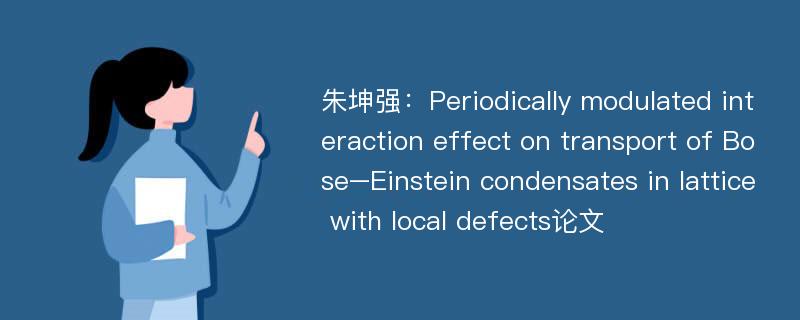
本文主要研究内容
作者朱坤强,鱼自发,高吉明,张爱霞,徐红萍,薛具奎(2019)在《Periodically modulated interaction effect on transport of Bose–Einstein condensates in lattice with local defects》一文中研究指出:We theoretically investigate the periodically modulated interaction effect on the propagation properties of a traveling plane wave in a Bose–Einstein condensate(BEC) trapped in a deep annular lattice with local defects both analytically and numerically. By using the two-mode ansatz and the tight-binding approximation, a critical condition for the system preserving the superfluidity is obtained analytically and confirmed numerically. We find that the coupled effects of periodic modulated atomic interactions, the quasi-momentum of the plane wave, and the defect can control the superfluidity of the system. Particularly, when we consider the periodic modulation in the system with single defect, the critical condition for the system entering the superfluid regime depends on both the defect and the momentum of the plane wave. This is different from the case for the system without the periodic modulation, where the critical condition is only determined by the defect. The modulation and quasi-momentum of the plane wave can enhance the system entering the superfluid regime. Interestingly, when the modulated amplitude/frequency, the defect strength, and the quasi-momentum of the plane wave satisfy a certain condition, the system will always be in the superfluid region. This engineering provides a possible means for studying the periodic modulation effect on propagation properties and the corresponding dynamics of BECs in disordered optical lattices.
Abstract
We theoretically investigate the periodically modulated interaction effect on the propagation properties of a traveling plane wave in a Bose–Einstein condensate(BEC) trapped in a deep annular lattice with local defects both analytically and numerically. By using the two-mode ansatz and the tight-binding approximation, a critical condition for the system preserving the superfluidity is obtained analytically and confirmed numerically. We find that the coupled effects of periodic modulated atomic interactions, the quasi-momentum of the plane wave, and the defect can control the superfluidity of the system. Particularly, when we consider the periodic modulation in the system with single defect, the critical condition for the system entering the superfluid regime depends on both the defect and the momentum of the plane wave. This is different from the case for the system without the periodic modulation, where the critical condition is only determined by the defect. The modulation and quasi-momentum of the plane wave can enhance the system entering the superfluid regime. Interestingly, when the modulated amplitude/frequency, the defect strength, and the quasi-momentum of the plane wave satisfy a certain condition, the system will always be in the superfluid region. This engineering provides a possible means for studying the periodic modulation effect on propagation properties and the corresponding dynamics of BECs in disordered optical lattices.
论文参考文献
论文详细介绍
论文作者分别是来自Chinese Physics B的朱坤强,鱼自发,高吉明,张爱霞,徐红萍,薛具奎,发表于刊物Chinese Physics B2019年01期论文,是一篇关于,Chinese Physics B2019年01期论文的文章。本文可供学术参考使用,各位学者可以免费参考阅读下载,文章观点不代表本站观点,资料来自Chinese Physics B2019年01期论文网站,若本站收录的文献无意侵犯了您的著作版权,请联系我们删除。
